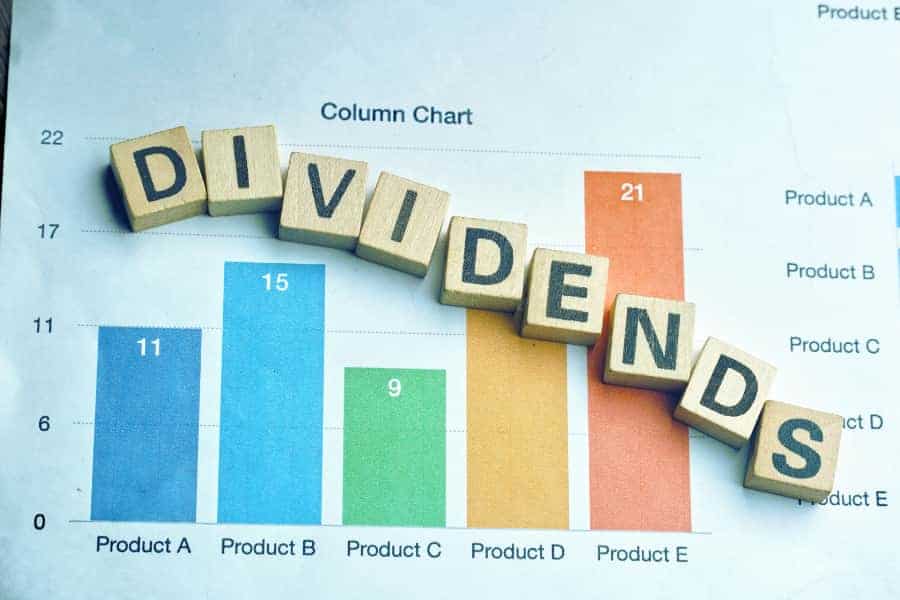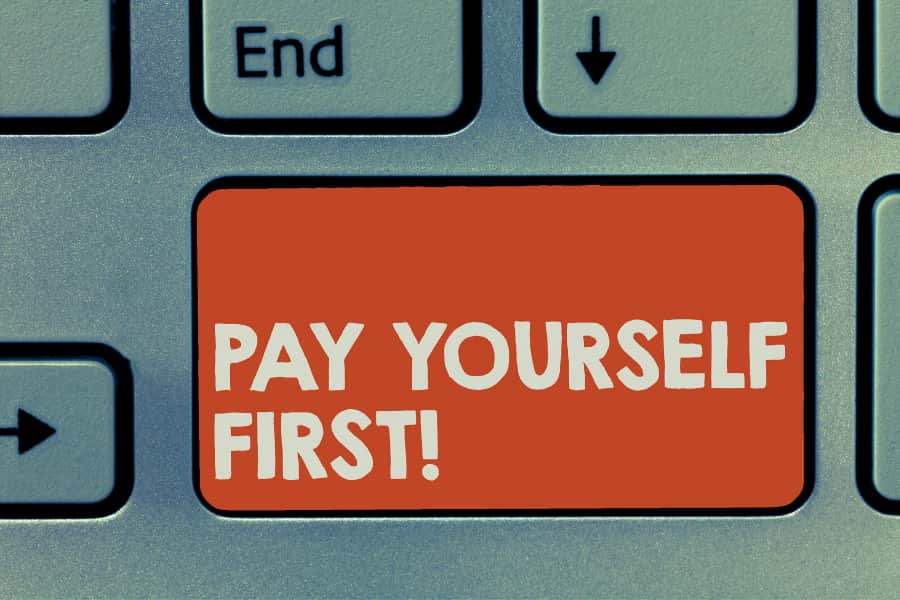As a business owner, knowing how to pay yourself is just one of the many things you have to be mindful of. Not only do you have to keep track of and manage your employee’s wages, but you also have to track your own! How you will pay yourself from your business will come down to your preference and your tax situation but this article will cover the specifics of how to pay yourself dividends.
If you want to pay yourself dividends in the UK, you will need to be mindful of the tax-free allowance of £12,500 on income and the additional £2,000 for dividend income. Going over this limit subjects you to paying tax on your dividend income at your applicable tax rate (7.5%, 32.5% or 38.1%).
There is quite a bit to learn when it comes to paying yourself as a business owner, but paying yourself via dividends has several administrative and tax benefits. This post will cover how to correctly pay yourself via dividends and why you may choose to do it this way.
What Are Dividends?
First of all, what exactly are dividends?
Dividends are traditionally a portion of a company’s profits that are paid to shareholders. It’s essentially a method of rewarding shareholders for investing in the company which benefits both the investor (through dividend pay-outs) and the company via attracting investors who contribute money to the business.
Shareholders are essential for a company because they supply the company with money. If you would like to learn more about this topic specifically, I would suggest clicking here.
It’s important to remember dividends can ONLY be paid out of a company that is turning a profit and how much they can payout is reflective of how large those profits are. The board of directors has to decide if they can even afford to pay investors.
Companies must also weigh up the benefits of paying out a dividend or reinvesting the profits into business activities. For a start-up, the preference is usually to use profits to invest in further expanding the business.
However, for blue-chip companies like Coca Cola, the profits are so large that it makes sense (and is often expected) for a dividend to be paid.
But what about you as someone who is running a business? How can you pay yourself dividends? And why would you want to?

Benefits of Paying Yourself Dividends
If you oversee a healthy company that is turning a profit, it becomes realistic to be able to pay yourself a portion of that profit. You can do this in one of two common ways: dividends or wages.
The latter is how most people choose to get paid since it is safer. Remember, you can only pay dividends if the company is turning a profit after paying the corporation tax bill. If a company isn’t doing so well, you will have to pay yourself in wages (salary).
The downside of paying yourself a salary is that you will be taxed at the ordinary level of income tax (20%, 40% or 45% depending on your tax band) and the more you pay yourself, the more the taxman will collect.
For example, if you want to earn between £12,501 to £50,000, you will be taxed 20% assuming you don’t have any other income outside of your business. This amount increases to 40% when you get paid between £50,001 to £150,000 and to 45% for incomes over £150,000.
There are plenty of benefits in paying yourself via a salary but the stringent tax rates can make this option less attractive. The solution for some is to pay yourself in dividends, which is a more tax-efficient method of supplying yourself with income.
How Taxation Works With Dividends
The tax benefits of paying yourself dividends are significant enough for many people to go down this route. Here is a quick comparison, courtesy of the people over at Unbiased:
| Basic Rate | Higher Rate | Additional Rate | |
| Salary | 20% | 40% | 45% |
| Tax Threshold | £12,500 to £50,000 | £50,001 to £150,000 | £150,001+ |
| Dividends | 7.5% | 32.5% | 38.1% |
| Tax Threshold | £14,500 to £50,000 | £50,001 to £150,000 | £150,001+ |
As you can see, dividends have a higher untaxed amount of £14,500 compared to £12,500 for wages alone due to a specific dividend tax-free allowance of £2,000.
Additionally, the tax rates for dividends are substantially lower. That is a significant amount of money you get to keep in your pocket, and laying this all out, it becomes clear why there are so many business owners who choose to pay themselves primarily in this way.
Additionally, with dividends you don’t have to pay national insurance contributions (NICs), which saves you more money still.
Example of Paying Yourself Via Dividends
Here is a realistic scenario where someone would utilize dividends as the majority of their income and the amount of money you would be left with after-tax.
You take a small salary of £10,000 to stay below the annual tax-free allowance threshold where you would need to pay income tax or NICs. The rest of your income will come from dividends of which you pay yourself £50,000. This initially leaves you with gross income of £60,000 before tax but you need to account for the tax-free personal allowance of £12,500, leaving you with £47,500 of taxable income.
But since the first £2,000 of dividends are not taxed, only £45,500 is left to be taxed, which will be at the basic rate of 7.5%, which will result in a tax bill of just £3,412.50 (£45,500 * 7%), which is significantly less than the 20% you would have been hit with if you had paid yourself entirely by salary.
It should be noted that this example doesn’t even take into account national insurance contributions.
As you can see from this example, utilizing dividends to pay yourself has great benefits; however, you should note some things before deciding to pay yourself in this fashion.

Are There Drawbacks to Paying Yourself Dividends?
In the ideal scenario, dividends are an excellent way to pay yourself whilst minimizing your tax bill. But there are some things to note:
- As mentioned above, you can only take dividends if the company is turning a profit; not only that but the company has to have a profit large enough to cover your desired annual income. If there is a slow year for your company, you may not be able to pay yourself dividends to the desired level.
- Relying on dividends is unpredictable for the reasons stated above; you don’t completely know if you are going to have a good year or not. The situation with COVID affecting small and large businesses is a testament to this. You can always fall back on a salary if this is the case but this may throw off your budgeting.
- You have to be careful not to take dividends that are not covered by profits. Otherwise, you will be taking out a director’s loan, which needs to be repaid. This is one of the key reasons you need to have decent accounting skills when relying on dividends. Or at least hire an accountant to help you out.
- Dividends are only paid after the business has been taxed, which can further hurt your chances of relying entirely on them.
- Dividends are paid as the ‘top-slice’ of your income. So if you earn other income of say £150,000, your dividend income will be taxed at the highest rate of 38.1%.
- The final point is important from a total tax position. Whilst paying yourself via dividends may minimise your personal tax bill, it may result in higher overall tax position including your corporation tax bill payable via your company. The reason for this is paying yourself a salary from your company will reduce your profit before tax figure which is charged at 19% corporation tax per year. For this reason, it’s important you consider the rates of tax you pay on your personal tax bill vs the 19% corporation tax rate each year.
In short, you have to ensure that your company is stable and profitable enough so that you can pay yourself dividends. If you don’t have strong accounting skills, you can work with an accountant to determine the best way to pay yourself. If you would like to work on your accounting skills, I recommend checking out the following Accounting Quickstart Guide.
The practical steps to paying out dividends
Dividends are separate from payroll so go through a different process before ending up in your bank account.
As mentioned above, the first step is checking you have sufficient current or retained profit to pay out the dividend. You can’t pay out a dividend in excess of your businesses profits.
Once this is confirmed, call a directors meeting. In this meeting, you will detail your intention to pay a dividend. Make sure minutes of this meeting are taken (recorded or notes taken of key parts).
Produce a tax voucher for each shareholder who will receive a dividend. This voucher will show the basic details of the shareholder (name, position, shareholding %) and the amount of dividends to be paid out.
Distribute the dividend via a bank transfer or cheque and give the shareholder the tax voucher as per the previous step.
Make sure your annual accounts reflect the dividend in the Statement of Changes in Equity and the equity section of the Balance Sheet and submit these to Companies House as you ordinarily would.
Conclusion
Paying yourself via dividends has many great benefits including a £2,000 dividend tax free-allowance, avoiding both employee and employer national insurance contributions and a lower tax rate (7.5% basic rate on dividends vs 20% basic rate on salaries).
If you are part of a healthy, profitable company and have come to the conclusion that paying yourself this way is realistic, then it’s certainly something that should be considered! Be mindful of the downsides mentioned above and work with an accountant if you have any doubt about the most tax-efficient solution for you and your company.
If you’d like further insight on this topic, I’ve included a video below:
https://www.youtube.com/watch?v=Fm34Ciszulc
As always, please remember I am an Accountant, but not your Accountant. In this post (and all of my others) I share information and oftentimes give anecdotes about what has worked well for me. However, I do not know your personal financial situation and so do not offer individual financial advice. If you are unsure of a particular financial subject, please hire a qualified financial advisor to guide you.
This article has been written by Luke Girling, ACA – a qualified Accountant and personal finance enthusiast in the UK. Please visit my ‘About‘ page for more information. To verify my ACA credentials – please search for my name at the ICAEW member finder. To get in touch with questions or ideas for future posts, please comment below or contact me here.
